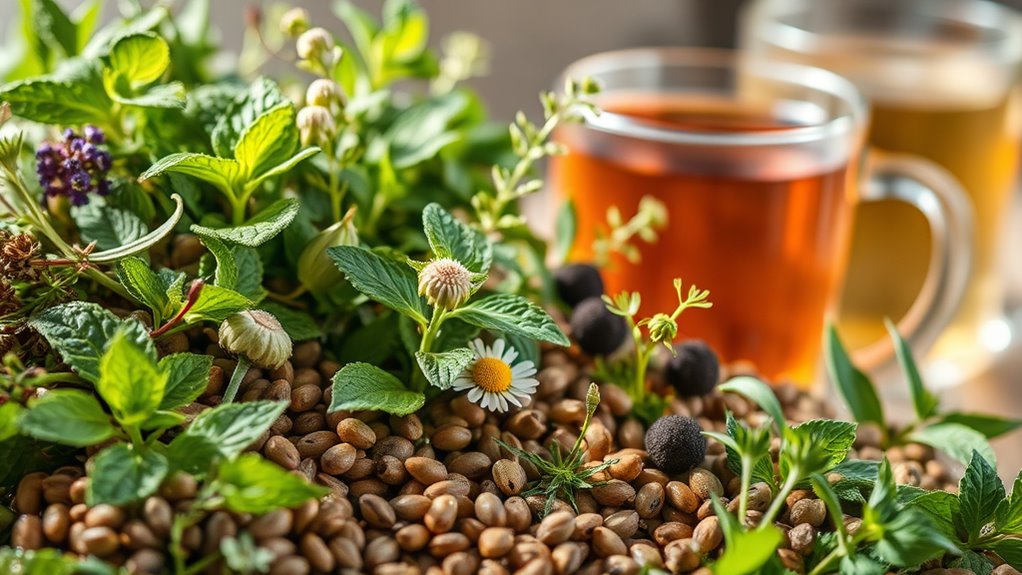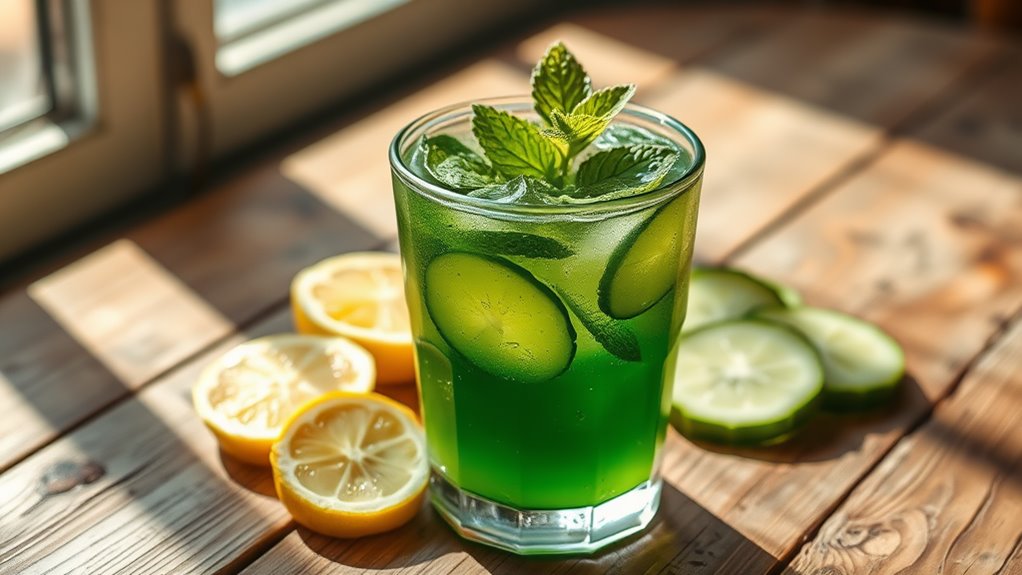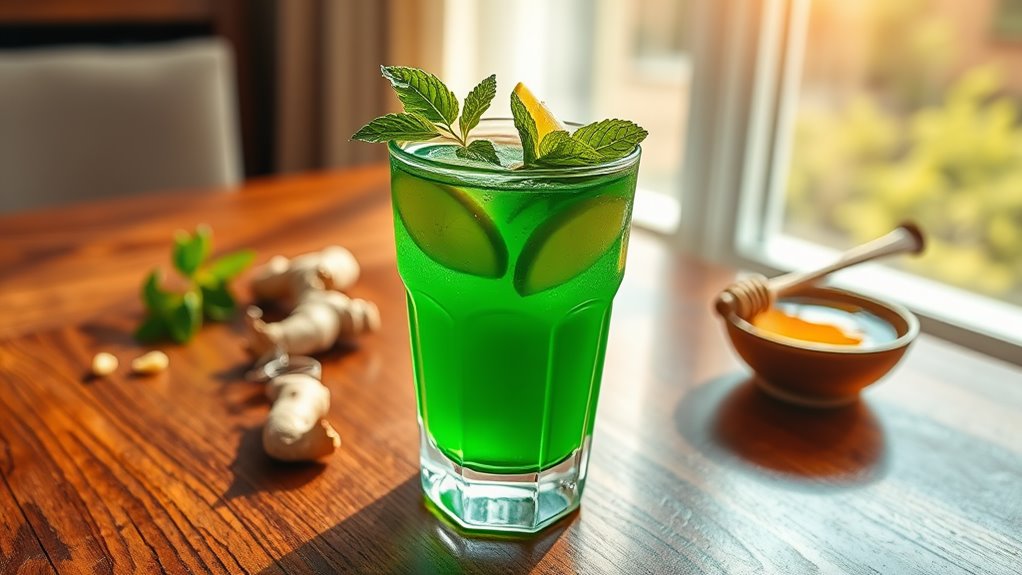Bloating Be Gone- This Herbal Remedy Works Fast!
Bloating can really cramp your style, but herbal remedies can help you feel better fast! Peppermint relaxes your digestive muscles, while fennel seeds expel gas naturally. Ginger boosts digestion and calms inflammation, and chamomile tea is a great post-meal soother. Just remember to stay hydrated and pair these herbs with a balanced diet. Want to discover quick recipes and additional tips for banishing bloating? Keep exploring to reveal all the secrets!
Key Takeaways
- Peppermint tea quickly relaxes the digestive tract and alleviates bloating discomfort.
- Fennel seeds can effectively reduce gas and promote digestive ease.
- Ginger enhances digestion and reduces inflammation, helping to relieve bloating.
- Chamomile tea serves as a natural relaxant, soothing the stomach after meals.
- Dandelion root stimulates bile production, supporting overall digestive health.
Understanding Bloating and Its Causes
Bloating can be uncomfortable and frustrating, especially when it strikes unexpectedly. You might feel a tightness in your abdomen or notice that your clothes fit differently.
Bloating often results from various factors, including overeating, eating certain foods, or swallowing air. High-fiber foods and carbonated drinks can contribute to the problem too. Stress and digestive disorders can also play a role. Probiotics help balance gut bacteria and can provide additional support in managing bloating.
Understanding what triggers your bloating is essential for finding relief. Many people turn to herbs for bloating, as they can offer natural support for digestion. Incorporating specific herbs into your routine can help ease discomfort and promote overall gut health. Ginger-lemon tea serves as a simple and effective way to enjoy these benefits.
Top Herbs for Relieving Bloating
When discomfort strikes your abdomen, certain herbs can come to the rescue, providing natural relief from bloating. Peppermint is a favorite for its soothing properties, helping to relax your digestive tract. Fennel seeds can also work wonders; they’re known to reduce gas and ease bloating. Ginger is another powerful ally, promoting digestion and reducing inflammation, and its natural anti-inflammatory properties can significantly aid in alleviating discomfort. Chamomile tea offers calming effects, perfect for soothing your stomach after a heavy meal. Finally, dandelion root aids digestion and supports liver function, which can help alleviate bloating. Incorporating these herbs into your routine can make a significant difference, bringing you the comfort you seek. Moreover, using herbal remedies can enhance your gut microbiome, which is crucial for overall wellness and digestive health. So, explore these options and find what works best for you!
How Each Herb Works to Reduce Discomfort
Understanding how each herb operates can help you choose the best remedies for your bloating discomfort.
Peppermint, for instance, relaxes your gastrointestinal muscles, allowing trapped gas to escape more easily.
Ginger’s anti-inflammatory properties soothe your digestive tract and facilitate digestion, reducing gas buildup.
Chamomile acts as a natural relaxant, easing tension and promoting a calm stomach.
Fennel seeds help expel gas and reduce bloating by relaxing the muscles in your digestive system.
Finally, dandelion root stimulates bile production, enhancing digestion and alleviating discomfort. Additionally, incorporating anti-inflammatory foods into your diet can further support digestive health and reduce bloating.
By knowing how each herb works, you can tailor your approach and effectively combat bloating, ensuring a more comfortable experience after meals.
Choose wisely, and enjoy the relief these herbs can provide!
Quick Recipes to Incorporate Herbs Into Your Diet
Incorporating herbs into your diet is a simple yet effective way to combat bloating and enhance your overall digestion.
Start your day with a revitalizing mint tea—just steep fresh mint leaves in hot water for five minutes.
For lunch, toss some fresh parsley into your salad; it’s not only flavorful but also aids digestion.
If you’re craving a snack, whip up a quick dill yogurt dip by mixing Greek yogurt with fresh dill, garlic, and lemon juice.
For dinner, try a ginger stir-fry; sauté fresh ginger with your favorite vegetables and protein.
Finally, finish your meal with a chamomile tea, which can soothe your stomach. Regularly incorporating heart-healthy ingredients into your meals can further support digestive health and overall well-being.
These quick recipes make it easy to enjoy the benefits of herbs daily!
Tips for Maximizing the Effectiveness of Herbal Remedies
To fully benefit from the herbal remedies you’ve started adding to your diet, consider a few key practices.
First, verify you’re using high-quality herbs, as potency can vary.
Next, be consistent; take your remedies regularly to allow your body to adjust and respond effectively.
Pair your herbs with a balanced diet rich in fiber to support digestion and enhance the remedies’ effects.
Stay hydrated, as water aids in the absorption of nutrients and helps flush out toxins.
Additionally, pay attention to dosage; too much can cause adverse effects.
Finally, keep a journal to track your symptoms and progress, which can help you fine-tune your approach and identify which remedies work best for you. Incorporating fermented foods can further promote a healthier microbiome and support your gut health.
Additional Lifestyle Changes for Bloating Relief
To effectively combat bloating, you’ll want to contemplate making some dietary adjustments and incorporating a regular exercise routine into your life.
Eating smaller, balanced meals and staying active can greatly improve your digestive health.
Let’s explore these lifestyle changes that can enhance your overall comfort and well-being.
Dietary Adjustments
While making dietary adjustments can feel overwhelming at first, these changes can markedly relieve bloating.
Start by keeping a food diary to identify potential triggers like dairy or gluten. Incorporate smaller, more frequent meals instead of large ones to ease digestion.
Focus on whole foods such as fruits, vegetables, lean proteins, and whole grains, while cutting back on processed foods high in sugar and sodium.
Remember to chew your food thoroughly; this helps break it down and reduces gas. Stay hydrated, but limit carbonated drinks that can introduce excess air.
Finally, consider increasing your fiber intake gradually to support gut health. These simple shifts can make a significant difference in how you feel.
Regular Exercise Routine
Incorporating a regular exercise routine can greatly enhance your efforts to relieve bloating. Physical activity stimulates digestion and helps move gas through your digestive tract, reducing discomfort. Aim for at least 30 minutes of moderate exercise most days, whether it’s brisk walking, cycling, or yoga.
These activities not only promote digestion but also relieve stress, which can contribute to bloating.
Don’t forget to include core-strengthening exercises, as a strong core supports proper digestive function. Listen to your body; if certain movements cause discomfort, opt for gentler exercises.
Consistency is key, so find an enjoyable routine you can stick with. By making exercise a priority, you’ll likely notice a significant improvement in your bloating symptoms and overall well-being.





